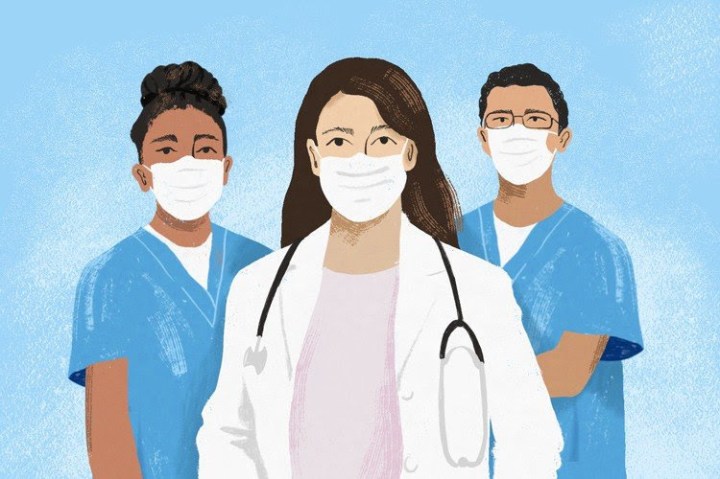GROUNDUP
Brain-drain alert: UK accused of poaching health workers from poorer countries

The years-long practice of using foreigners to plug gaps in the British health system is insensitive and morally questionable, doctors write in the 'South African Medical Journal'
Two doctors have written a scathing letter in the South African Medical Journal, criticising the UK for hiring a disproportionate number of health workers from foreign countries.
Professor Johannes Fagan from the University of Cape Town and Professor Mahmood Bhutta from Royal Sussex County Hospital wrote: “The UK already has one of the highest proportions and overall numbers of overseas-qualified doctors in its workforce, yet continues to actively encourage and support overseas health workers to relocate. Current UK immigration rules recognise all medical practitioners (as well as nurses, paramedics, radiographers, occupational therapists and speech and language therapists) as shortage occupations, and for migrants offered such a post in the National Health Service (NHS) grant a reduced visa fee and support with relocation.”
They point out that a recent report by the UK’s General Medical Council (GMC) “suggested that ‘overall numbers will need to rise further’”. The report said the UK will require “a continuation of the large number of doctors from overseas joining our workforce”.
This position, Fagan and Bhutta wrote, “seems insensitive to the well-documented and morally questionable problem of ‘brain drain’”.
The authors criticise the UK government’s years-long practice of actively recruiting health workers from overseas to fill the gaps in the British health system.
They point out that in 2019 nearly 35% of doctors licensed to practice in the UK had obtained their qualifications overseas.
Statistics for the NHS show that more than 170,000 of the 1.28 million staff are from other countries – nearly 14%. About 67,000 are from other European (EU) countries and a further 64,000 from Asia.
About 1,719 are from South Africa, 806 from Kenya, 4,192 from Zimbabwe and 8,241 from Nigeria. The House of Commons reports that the proportion of non-EU nurses at the NHS rose from 8% in 2015 to 22% between 2019 and 2020.
(Since nationality is self-reported, it’s possible that these numbers are overstated by some people describing their cultural heritage instead of country of birth.)
Fagan and Bhutta refer to a 2006 World Health Organisation report which found that at least 25% of doctors in sub-Saharan Africa had migrated despite only 5% of the population having access to adequate healthcare. They also refer to an article that found that migration of physicians from low- to high-income environments does not only have economic effects; it is also associated with “excess mortality”.
Fagan told GroundUp there is a distinction between migration and recruiting. “I have no problem with migrating, but I do have a problem with countries recruiting, and I think that’s where I draw the line. I understand there are doctors and nurses in this country who want to seek greener pastures elsewhere because things are often difficult here. I do have a problem with an active recruitment process that is happening in the UK.”
He added: “There are things we can do to make it more attractive for people to stay. I am also interested to know if the South African government has approached the UK and said: ‘Hold on, stop recruiting our doctors and nurses.’ We have an agreement with other [Southern African Development Community] countries not to recruit doctors from there, with the whole idea of not doing what the UK is doing. So the question is whether or not we have picked up the same agreement with the UK and US and Australia.”
South African Health Department spokespeople did not respond to our attempts to contact them.
The UK Health Department, by email, denied it was actively recruiting health workers from low-resource countries. “The medical profession is an international mobile occupation and we are aware that a significant number of doctors from low-income or lower-middle-income countries migrate to the UK to work in the NHS of their own accord, rather than being proactively targeted.
“We are reviewing and updating our Code of Practice and list of countries we will not actively recruit from to protect weaker health systems, with engagement from other government departments and the World Health Organisation. We are also ensuring ethical recruitment practices are followed through improved agency frameworks and comprehensive guidance for recruiters.” DM
















 Become an Insider
Become an Insider
Local doctors have to compete with Cuban “doctores” (drivers and cleaners included) paid in US currency…well, not them either, but to the Cuban government…..
The UK also suffered a brain drain of their medics going to the US for better pay. Maybe they and we should reconsider the financial situation of medical personnel and help them to stay at home
Lets not ignore the push factors driving our doctors overseas. A major problem in the South African public health service is the lack of funded posts to employ medical and allied health practitioners. So even if they want to work in the public service in South Africa, there is no place prepared to take them on.
After doctors complete their 2 years internship and one year community service there is a scramble for the limited medical officer and registrar posts to continue their employment in the public service. For the last 8 years. I am aware of doctors being unemployed after completing their community service. This is in spite of them willing to take up any post anywhere in the country
(the DoH usually says that there are posts but the doctors are unwilling to relocate, but the DoH never says where these posts are, and whether these posts are funded).
The problem gets worse in January every year.
A partial solution would be to ring fence the budgets for medical and allied health practitioners – maybe Tito can go as far to make it a conditional grant.